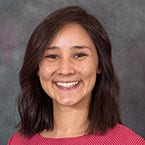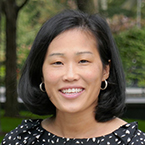AACR-Bristol Myers Squibb Fellowships
The AACR-Bristol Myers Squibb Fellowships represent a joint effort to encourage and support mentored young investigators to conduct cancer research. Funded research projects are translational or clinical in nature.
2023 grantee

Research
Gastric cancer (GC) is a significant cause of cancer incidence and mortality disparities among Hispanic/Latinos (HLs). HLs are approximately twice as likely to be diagnosed with and die from GC compared with non-Latino whites and are also more often diagnosed at earlier ages but at later stages of disease, for which survival rates are significantly worse. Despite this high burden of disease, relatively little data exists characterizing the molecular etiology of GC among HLs. This research will leverage existing genomic and epigenomic sequencing data from HLs with GC generated in a large multi-center NCI-funded study (U54 CA233306) to identify driver somatic epigenetic changes and genetic ancestry-associated germline risk loci that contribute to GC development, therapeutic response, and ultimately, health disparities among HLs in the US.
Biography
Dr. Halmai received her doctorate from the University of California (UC) Davis in 2019 in molecular, cellular and integrative physiology where she developed a novel genome editing platform for the functional modeling of cancer risk-associated variants. As a graduate student, Dr. Halmai was both an NIH-Initiative for Maximizing Student Development and NIH-Molecular and Cellular Biology T32 training fellow. She is currently a postdoctoral researcher at the UC Davis Genome Center. Her research is focused on the development of pre-clinical cancer models and (epi)genomic data from racial/ethnic minority populations to advance cancer health equity for these communities.
Acknowledgement of Support
“I am exceedingly grateful to the AACR and Bristol-Myers Squibb for providing this opportunity. Being a Cancer Disparities Research Fellow will provide me with the support to advance my career in the field of cancer health disparities and, most importantly, give back to our communities of color through my research.”

Research
Squamous cell carcinomas (SCCs) are among the most common malignancies and can occur in most stratified epithelial tissues including the skin. SCCs can metastasize and often recur following treatment, a feature conferred by a population of cancer stem cells. Risk for SCC invasion and metastasis rises precipitously in individuals with impaired immune function, highlighting the role of the immune system in safeguarding against malignancy. How immune cells interact with cancer stem cells to suppress SCC invasion and metastasis is poorly understood but could be key for future development of cancer therapeutics. Of equal importance are nerve fibers innervating SCCs and many other types of cancers. Tumor innervation is correlated with poor prognosis and has the potential to modulate tumor and immune cell activities. Dr. Song will interrogate the communication among cancer stem cells, immune populations, and sensory nerves in tumors to understand how these interactions may shape cancer progression.
Biography
Dr. Song graduated summa cum laude from Bryn Mawr College and received her doctorate in immunobiology from Yale University. During her graduate training, she studied how interactions between T and B lymphocytes shape protective and pathological immunity. Dr. Song is conducting her postdoctoral work at the Rockefeller University where she studies cellular crosstalk among cancer stem cells, immune cells, and the peripheral nervous system.
Acknowledgment of Support
“I am honored and grateful to be the recipient of the 2023 AACR-Bristol Myers Squibb Immuno-oncology Research Fellowship. This invaluable opportunity will allow me to improve our collective understanding of the important and intricate cellular communication network underlying cancer progression.”
2022 Grantees

Research
Multiple myeloma and its precursor, monoclonal gammopathy of undetermined significance (MGUS), both occur twice as often within Black populations compared to Whites. This suggests that racial disparities lie within the development of MGUS, and not progression to malignancy. Few studies have been conducted on MGUS within African cohorts. With the help of collaborators, Dr. Cicero is set to determine the prevalence of MGUS in a population of Black men and women in Eswatini. They will also assess the relationship between HIV status and MGUS by employing univariable and multivariable logistic regressions, controlling for age, gender, and socioeconomic status. They expect their results to be applicable not just to those in sub-Saharan Africa, but also to populations of African descent here in the US.
Biography
After graduating cum laude from Cornell University, Kara Cicero attended Tulane University School of Medicine, where she was inducted into the Alpha Omega Alpha Honor Medical Society. She also pursued a joint MPH in Global Health Systems and Development, where she received the Ling and Jessop Awards for teaching local healthcare workers in Malawi. During her internal medicine residency at Columbia University, she developed an interest in oncology and is now a clinical fellow in hematology and medical oncology at Columbia. Throughout her training, she has been involved in numerous research endeavors focused on hematologic malignancies within global oncology.
Acknowledgment of Support
I am thrilled to receive the Cancer Disparities Fellowship and grateful for the opportunity to lead my first major project! I hope that our study will deepen our understanding of the racial disparities surrounding MGUS and multiple myeloma in an understudied population that is also most likely to be affected.

Research
Ovarian cancer (OvCa) is a highly immunosuppressive malignancy that is refractory to standard treatments and all current forms of immunotherapy. We have uncovered that harsh conditions in the ovarian tumor microenvironment compromise the protein-folding capacity of the endoplasmic reticulum (ER) in intratumoral T cells, causing abnormal ER stress response activation of the IRE1α-XBP1s branch and severe intratumoral T cell dysfunction. However, the precise molecular mechanisms by which IRE1α-XBP1s signaling governs global effector profiles in intratumoral T cells facing ER stress remains largely unexplored. Dr. Hwang aims to explore how XBP1s operates as a novel transcriptional regulator controlling the expression of factors required for optimal T cell activation, differentiation, and anti-tumor function.
Biography
Dr. Hwang completed his doctorate from the Pohang University of Science and Technology, Republic of Korea. During his doctoral studies, he developed a variety of genetically engineered mice and experimental models to understand the molecular mechanisms regulating the differentiation and activity of T cells in autoimmunity and cancer. He is currently a postdoctoral fellow at the Weill Cornell Medicine in New York City, where he is developing new forms of adoptive cellular immunotherapies based on ovarian cancer-reactive T cells lacking endoplasmic reticulum stress sensors, which are expected to have increased persistence and enhanced protective function in the harsh ovarian tumor microenvironment.
Acknowledgment of Support
Receiving the 2022 AACR-Bristol Myers Squibb Immuno-oncology Research Fellowship is a great honor and a key milestone in developing a career in cancer research. I sincerely thank the AACR for funding my project which seeks to contribute towards a more comprehensive understanding of the tumor microenvironment as a critical impediment to the success of immunotherapy in ovarian cancer.
2021 Grantees

Research
Although immune checkpoint blockade (ICB) has had remarkable clinical success, it can potentially cause inflammation in organs that clinically resembles autoimmune disease. Applying genetic approaches in mouse models, Dr. Burke aims to 1) elucidate how loss of CTLA-4 and PD-1 signaling alters the function of CD4+ during tumor growth or the development of spontaneous inflammation and 2) develop strategies to blunt the undesired inflammation and immunopathology.
Biography
Dr. Burke obtained her MD and PhD in immunology from the Johns Hopkins School of Medicine, where she studied the T cell response against the hepatitis C virus. She completed her internal medicine residency at Massachusetts General Hospital and is a medical oncology fellow at the Dana-Farber Cancer Center. Dr. Burke is a post-doctoral fellow at Harvard Medical School, where she studies the development of protective anti-tumor immunity and the development of adverse events.
Acknowledgment of Support
I am tremendously honored to be the recipient of the 2021 AACR-Bristol Myers Squibb Immuno-oncology Research Fellowship. This support will advance my research and goal to become an independent investigator at the intersection of clinical oncology and basic mechanisms in immuno-oncology.